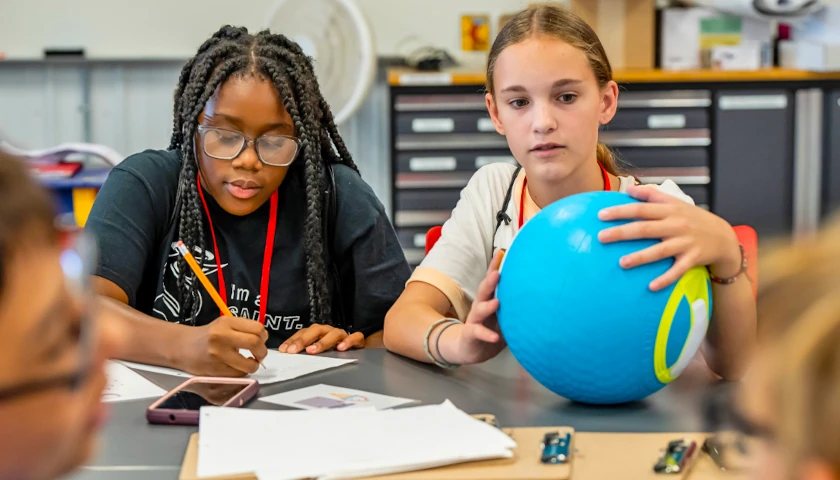by Christina Lengyel
An unorthodox learning program percolating across Pennsylvania schools infuses business innovation into traditional curriculum, leaving lawmakers split on its effectiveness.
Dr. Adelle Schade, founder of the Total Learning Experience, told a joint Senate committee on Tuesday about how she “reimagined” school curriculum to help students “win at capitalism.”
Schade developed her learning framework, she says, while studying business as a public science teacher. She said she “realized that teachers are really project managers who are never taught the skills of project management.”
Schade says that applying the skills she learned from business allowed her to make drastic improvements in her own classroom at Conrad Weiser High School. The gains she saw with her students and her own increased engagement as a teacher were significant, so she began to formalize and expand the program into what is now Total Experience Learning.
The program today is offered among other for-credit courses at Albright College, allowing teachers to fulfill continuing education requirements and even move toward a Master’s degree through its completion.
Total Experience Learning remains distinct from the school as a trademark of ConvergEd, a business founded by Schade in 2018. Though both the phone number and website for ConvergEd have been disconnected, a LinkedIn page for the company describes its purpose as “a framework for integrating research-based learning experiences into education for students of all ages.”
There to share their experiences with the program were students and faculty from Governor Mifflin School District where the Total Experience Learning strategies have been implemented in many classrooms. Speakers included student Addy Alexander, teacher Abby McKay and Superintendent Lisa Hess.
Their testimony bubbled over with praise for the program.
Alexander described a classroom experience in which she was able to apply poetry to real life scenarios by aligning her reading to a business pitch and presenting it in a scenario mirroring the popular television show, Shark Tank.
McKay described a massive increase in enrollment for her journalism class, where students now see real-world applications for the media skills she teaches.
Meanwhile, Hess lauded her own son’s transformation in math.
Supporters say the foundation of the program is experience, or learning through doing, something that occurs naturally across species. Experiential learning as a theory of education, however, was largely developed in the 1970s by David Kolb, who emphasized self-reflection and context. It is taught widely in college pedagogy courses.
Proponents of Total Experience Learning place a strong emphasis on intellectual property, encouraging students and teachers alike to capitalize on and protect their educational experiences and any subsequent innovations by applying for patents.
During the hearing, Schade showed a map illustrating wide swaths of the state outside Philadelphia, Pittsburgh and State College where innovation, as measured in patent filings, is lagging. The program has seen 12 students receive patents for innovations they developed at their schools over the past three years.
Albright wants to expand the program within its developing Innovation Corridor, made possible by a $3 million federal grant. The school also launched a new School of Business and Professional Studies in April, despite recent headlines hinting at financial mismanagement and upheaval.
The college saw student protests in April demanding greater transparency followed by a faculty vote of no-confidence for then President Jacquelyn Fetrow. Fetrow resigned from her post the following month.
The school has since cut 53 faculty and staff positions along with programs like the swim team in order to help reconcile its financial difficulties.
The Total Experience Learning program, however, appears to be a sharp contrast to the institution’s financial woes, boasting massive support from grants and community members alike.
Barry Schlouch, a graduate of the Governor Mifflin School District and founder of an excavation business, said his upbringing on a farm presented a model of experiential learning, which he credits with his ability to build his company. He says he reinvests profits to help teachers complete the Total Experience Learning program.
“What I saw was a systematic approach to preparing students to win in capitalism,” said Schlouch, repeating the phrase a second time for emphasis.
Schlouch is also a financial supporter Republicans sitting on both committees. In the 2024 election cycle, he has so far donated $2,800 to the campaign of Sen. Scott Martin, R-Strasburg, and chair of the Appropriations Committee, whose District 13 covers Brecknock Township within the Governor Mifflin School District.
He has also donated $500 this year and $1,500 in 2023 to Sen.Dave Argall, R-Mahanoy City, chair of the Education Committee.
Martin described an unplanned visit he made to Governor Mifflin alongside Schlouch during which he got to see the Total Experience Learning experience firsthand in the classroom, after which he shared Schlouch’s glowing praise of the program.
Martin expressed awe at “getting to experience the kids and just how professional they were in even running a coffee shop that was there.” After seeing elementary students’ enthusiasm for the library, he said, “It almost made me want to pick up a book.”
Legislators, however, were not completely without hesitation.
“There’s a crisis in Philadelphia, said Sen. Anthony Williams, D-Philadelphia, who noted the steady procession of such celebrated new curricula. “We have to catch children up. This is going to save them, and it doesn’t. We waste time doing it.”
However, Williams was ultimately optimistic about supporting teachers in his own district to pursue the program.
– – –
Christina Lengyel is a contributor at The Center Square.
Photo “Total Learning Experience” by Albright College.









